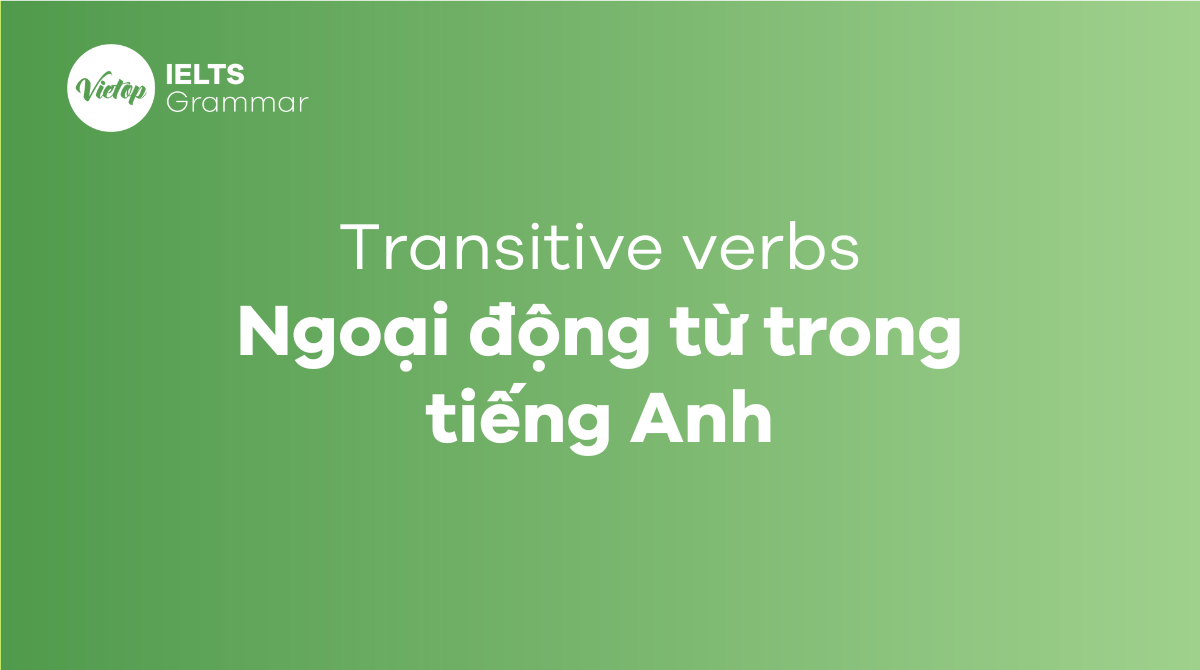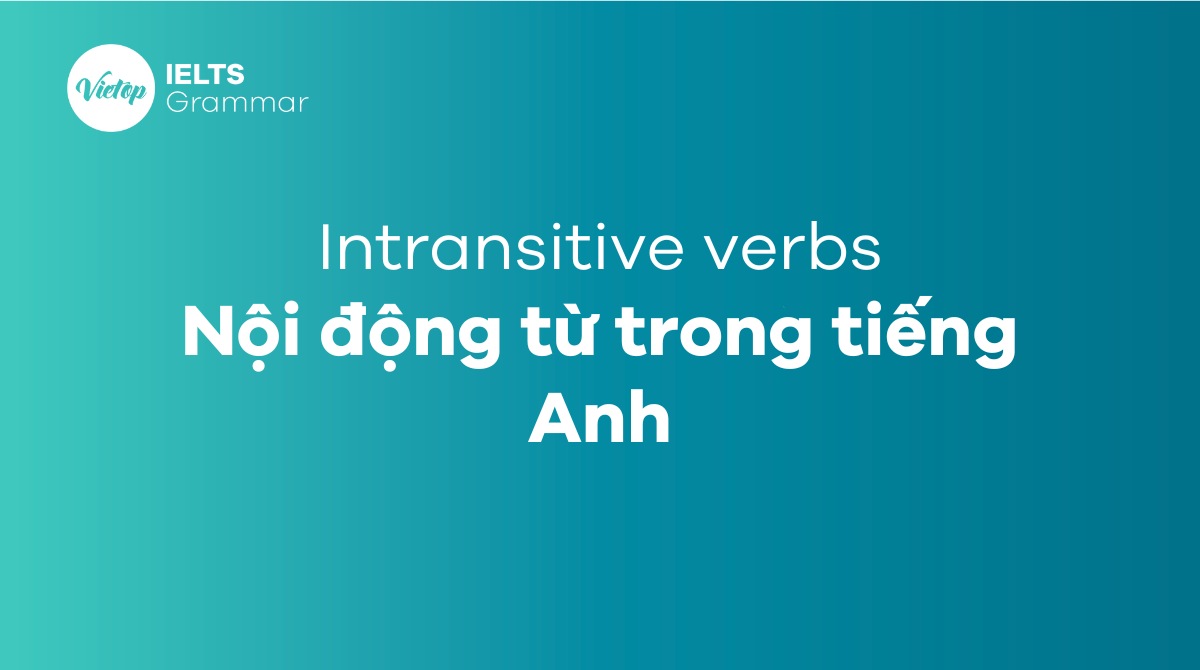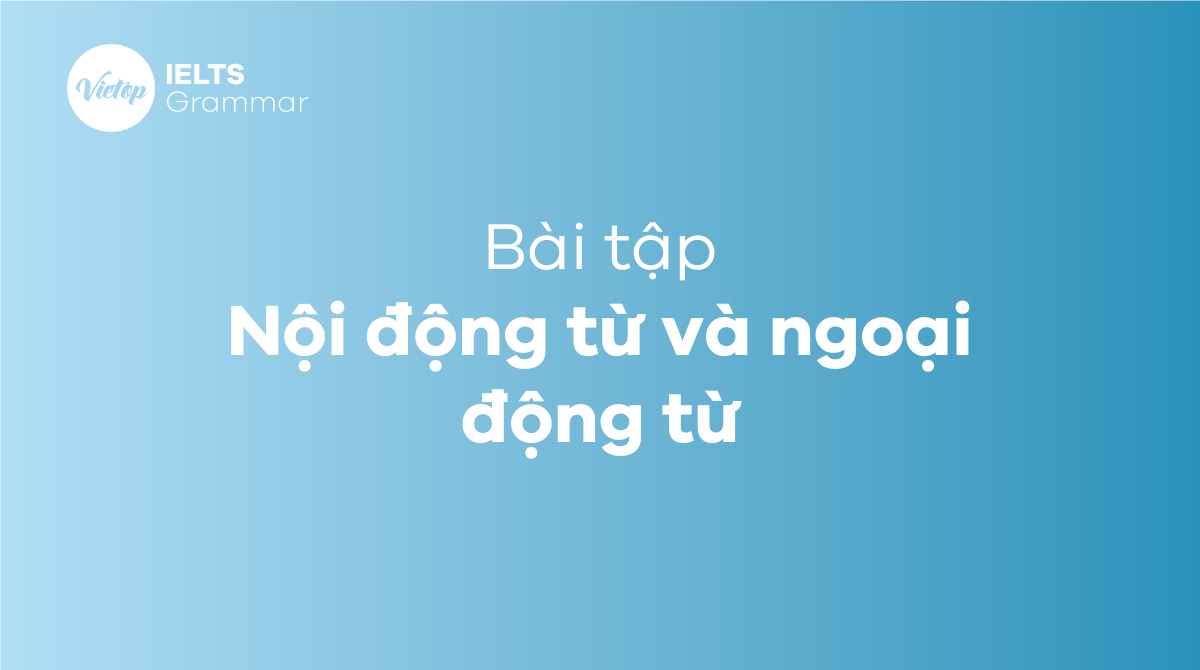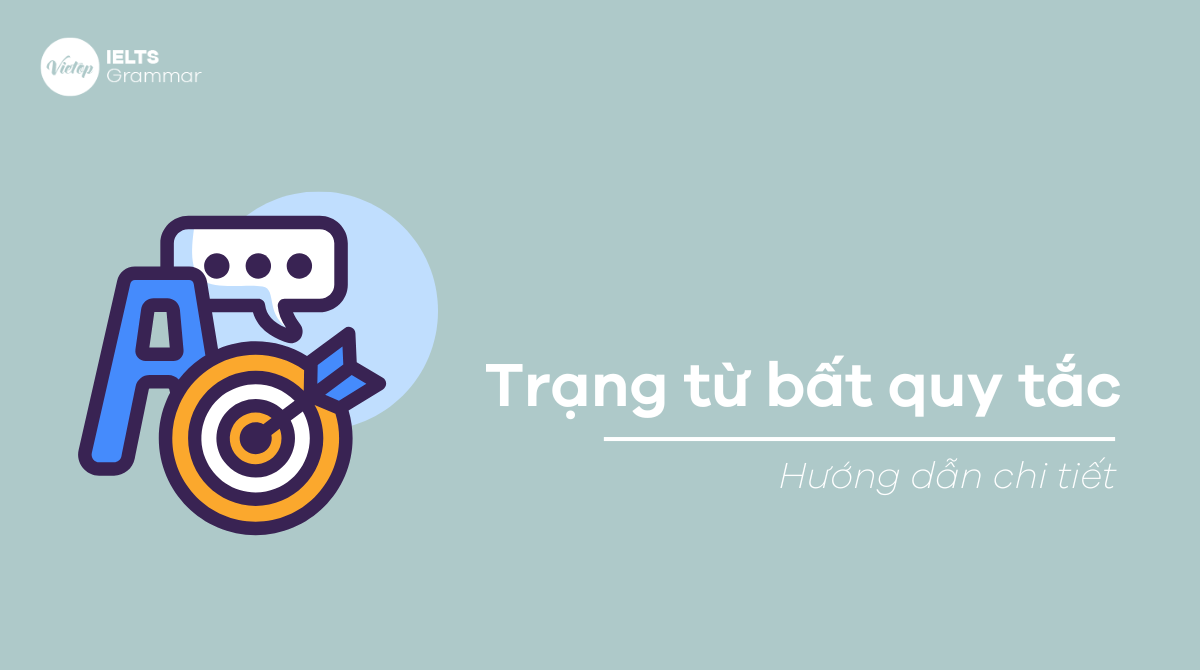Chắc hẳn khi bắt đầu học tiếng Anh bạn đã từng nghe tới nội động từ và ngoại động từ trong tiếng Anh. Vậy chúng là gì, có gì khác nhau và sử dụng như thế nào? Hãy cùng Vietop tìm hiểu điểm kiến thức này ở bài viết sau nha.
1. Ngoại động từ (transitive verbs)
Một số động từ thường được dùng theo sau bởi danh từ hoặc đại từ, và đóng vai trò là tân ngữ. Ta gọi những động từ này là “transitive” (ngoại động từ).
- Let’s invite Sally to our party. (
chứ không phải Let’s invite to our party.) - You surprised me. (
chứ không phải You surprised.)

Một số ngoại động từ phổ biến:
| accept | dazzle |
| acknowledge | deceive |
| admit | define |
| aggravate | describe |
| answer | destroy |
| ask | discover |
| avoid | distinguish |
| beat | drag |
| bend | dress |
| bless | dunk |
| bother | edify |
| break | embarrass |
| brush | embrace |
| build | enable |
| cancel | encourage |
| capture | entertain |
| carry | execute |
| catch | enlist |
| change | fascinate |
| chase | finish |
| chastise | follow |
| clean | flick |
| collect | forget |
| comfort | freeze |
| contradict | frighten |
| convert | forgive |
| crack | furnish |
| gather | keep |
| grab | key |
| grasp | kill |
| grip | kiss |
| grease | knock |
| handle | lag |
| hang | lay |
| head | lead |
| highlight | lean |
| honour | leave |
| hurry | lighten |
| hurt | limit |
| help | link |
| imitate | load |
| impress | love |
| indulge | lower |
| insert | maintain |
| interest | marry |
| inspect | massage |
| interrupt | melt |
| intimidate | mock |
| involve | munch |
| irritate | murder |
| join | notice |
| judge | number |
| offend | strike |
| order | surprise |
| page | swallow |
| paralyze | switch |
| persuade | teach |
| petrify | taste |
| pierce | tickle |
| place | tighten |
| please | toast |
| poison | transform |
| possess | tweak |
| prepare | twist |
| promise | turn |
| protect | toss |
| purchase | try |
| punch | underestimate |
| puzzle | understand |
| question | unlock |
| quit | unload |
| raise | use |
| reassure | untie |
| recognise | upgrade |
| refill | vacate |
| retard | want |
| ring | warm |
| run | wash |
| satisfy | warn |
| scold | watch |
| select | widen |
| slap | wear |
| smell | win |
| soften | wipe |
| specify | wrack |
| spell | wrap |
| spit | wreck |
| spread | weep |
Xem thêm:
2. Nội động từ (intransitive verbs)
Một số động từ thường không theo sau bởi danh từ hay đại từ. Ta gọi chúng là “intransitive” (nội động từ).
E.g:
- Sit down. (
Chứ không phải Sit that chair.) - I usually sleep well. (
Chứ không phải I usually sleep the bed well.)

Một số nội động từ phổ biến:
| Agree | Appear |
| Arrive | Become |
| Belong | Collapse |
| Consist | Cost |
| Cough | Cry |
| Depend | Die |
| Disappear | Emerge |
| Exist | Explode |
| Fade | Fall |
| Fast | Float |
| Fly | Gallop |
| Go | Grow |
| Happen | Have |
| Hiccup / hic-cough | Inquire |
| Jump | Kneel |
| Knock | Last |
| Laugh | Lead |
| Lean | Leap |
| Learn | Left |
| Lie | Limp |
| Listen | Live |
| Look | March |
| Mourn | Move |
| Occur | Panic |
| Party | Pause |
| Peep | Pose |
| Pounce | Pout |
| Pray | Preen |
| Read | Recline |
| Relax | Relent |
| Remain | Respond |
| Result | Revolt |
| Rise | Roll |
| Run | Rush |
| Sail | Scream |
| Shake | Shout |
| Sigh | Sit |
| Skip | Sleep |
| Slide | Smell |
| Smile | Snarl |
| Sneeze | Soak |
| Spin | Spit |
| Sprint | Squeak |
| Stagger | Stand |
| Stay | Swim |
| Swing | Twist |
| Vanish | Vomit |
| Wade | Wait |
| Wake | Walk |
| Wander | Wave |
| Whirl | Wiggle |
| Work | Yell |
Lưu ý: Một số động từ có thể vừa có tính chất transitive, vừa có tính chất intransitive.
E.g:
- Lose: England lost = England lost the match.
- Eat: Let’s eat = Let’s eat this meal
Một số động từ có thể trở thành transitive hay intransitive tùy thuộc vào chủ ngữ của nó. Nét nghĩa intransitive thường có tính chất gần giống như thể bị động. Người ta gọi dạng động từ này là “ergative”.
| Transitive | Intransitive |
| She closed the door. | The door closed. |
| I can’t start the car. | The car won’t start. |
Một số động từ thuộc nhóm này: begin, bend, break, burn, change, decrease, drop, finish, increase, move, open, rip, sell, shut, start, vary, wake.
Xem thêm:
- Bài tập về động từ khuyết thiếu
- Bài tập thì tương lai đơn và tương lai gần
- Bài tập thì quá khứ đơn và quá khứ tiếp diễn
3. Bài tập vận dụng

State whether the verbs in the following sentences are used transitively or intransitively.
- Heat expands metals. (Transitive/ Intransitive)
- Metals expand on heating. (Transitive/ Intransitive)
- The driver stopped the car. (Transitive/ Intransitive)
- The car stopped abruptly. (Transitive/ Intransitive)
- You must speak the truth. (Transitive/ Intransitive)
- You must speak loudly. (Transitive/ Intransitive)
- The boy is flying the kite. (Transitive/ Intransitive)
- The birds are flying in the sky. (Transitive/ Intransitive)
- The rider fell off the horse and broke his arm. (Transitive/ Intransitive)
- The woodcutter felled a huge tree. (Transitive/ Intransitive)
- The explosion sank the ship. (Transitive/ Intransitive)
- The ship sank suddenly. (Transitive/ Intransitive)
Answers
- Transitive verb – expands ( object – metals)
- Intransitive verb – expand
- Transitive verb – stopped (object – car)
- Intransitive verb – stopped
- Transitive verb – speak (object – truth)
- Intransitive verb – speak
- Transitive verb – is flying (object – kite)
- Intransitive verb – are flying
- Intransitive verb – fell off
- Transitive verb – felled (object – tree)
- Transitive verb – sank (object – ship)
- Intransitive verb – sank
Chúc các bạn học tập tốt với nội động từ và ngoại động từ trong tiếng Anh.





![[Mới nhất] Cập nhật bảng tổng hợp quy đổi điểm IELTS sang điểm xét tuyển đại học khu vực phía Nam 2025](https://vietop.edu.vn/wp-content/uploads/2025/12/thumbnail-cap-nhat-bang-quy-doi-diem-ielts.jpg)



